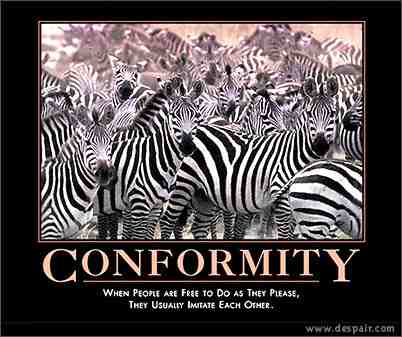Ok. So you want to make a big statement. You are an anarchist and that means you are an individual. You may be a radical rebel anarchist, an armchair anarchist, an apathetic anarchist, a philanthropist to anarchist causes or just wildly disinterested in mainstream but at some stage you are going to face a conundrum. The conundrum of conformity.
How much participation is “conformity”?
Government is bad, right? Government is wasteful, oppressive, cruel, dangerous, ineffective and prone to the gyrations of public whims and demagogue fancy. Governments alone can impose the death penalty, enforce gridlocked education standards, and force a large part of the population to go to war for reasons they won’t understand to kill people they don’t know and don’t dislike, who have done them no personal harm whatsoever. Yet it is government that provides the basic infrastructure that makes a modern society function. In return for that infrastructure and the promise to provide something vaguely defined as national security, the government asks that you conform to the processes and procedures by which society is run. And that’s the grist of this note.
Conformity is uncool for the young, the artistic, the dispossessed and the elite. For the anarchist though, conformity is the slippery slope to the death of an ideology. The anarchist feels constrained by the lane marks painted on a highway, by speed limits, no access signs, inane job functions and blind acceptance of authority. So an anarchist takes every measure of acceptance of social norms as an insult – a shackle built to tie the masses in a group big enough and faceless enough to be comfortably oppressed by a small group of key-holders.
What would be the ideal? Everybody’s list would differ. How about:
- No tax file numbers
- No public records of individuals
- No driver’s licences
- No car registration
- Telephones that were completely untraceable?
Anyone trying to instigate an outcome like this would find life very difficult in a modern society. “Big Brother” was the term used in the classic novel 1984, and some of the ideas in the book are eerily reflected in todays’ society. The book envisages a world where recording devices can track your every word but the book could not even begin to envisage the situation today, where not just audio but video as well are recorded from millions of CCTV devices across major cities.
In a globe of constrained financial resources, where paying a cop to patrol a city street is a waste of money because she/he isn’t actually “doing anything”, the logical next-step is to leverage the people you do have available to be able to patrol tens or hundreds of streets simultaneously. Enter the world of CCTV. In the Australian state of Victoria, teachers are asking for CCTV cameras to be installed to record instances of violence, while north of that state, CCTV cameras have located a missing person. It’s a tumultuous time to be thinking about how society enforces the laws it promulgates.
The conundrum of a government that may actually “care”…
If government is bad, how does an anarchist society deal with crime? The big guy will quite naturally dominate the meek guy (insert suitable gender stereotypes if you see a need to make this testicular statement feel more comfortable). Theory has it that this will all be dealt with via community coercion and communication. Hands up anyone who has seen the local school/sport/club/business/political bully successfully dealt with by a committee…?
Hence the conundrum. An Anarchist argues that government is bad. And it quite often is. Yet what viable, inclusive, moderating, non-repressive template is offered as an alternative?
The Apathetic Anarchist radiates empathy for the Anarchist cause – but assesses any claims for ‘a better way’ through objective, prudent, inclusive and historically back-tested criteria that more often than not finds a robust claim wanting. If society actually helps to provide an environment in which you are free to pursue your Anarchist bent, to what extent do you participate in that society?
If you have an Anarchist leaning, how do you deal with this conundrum?

